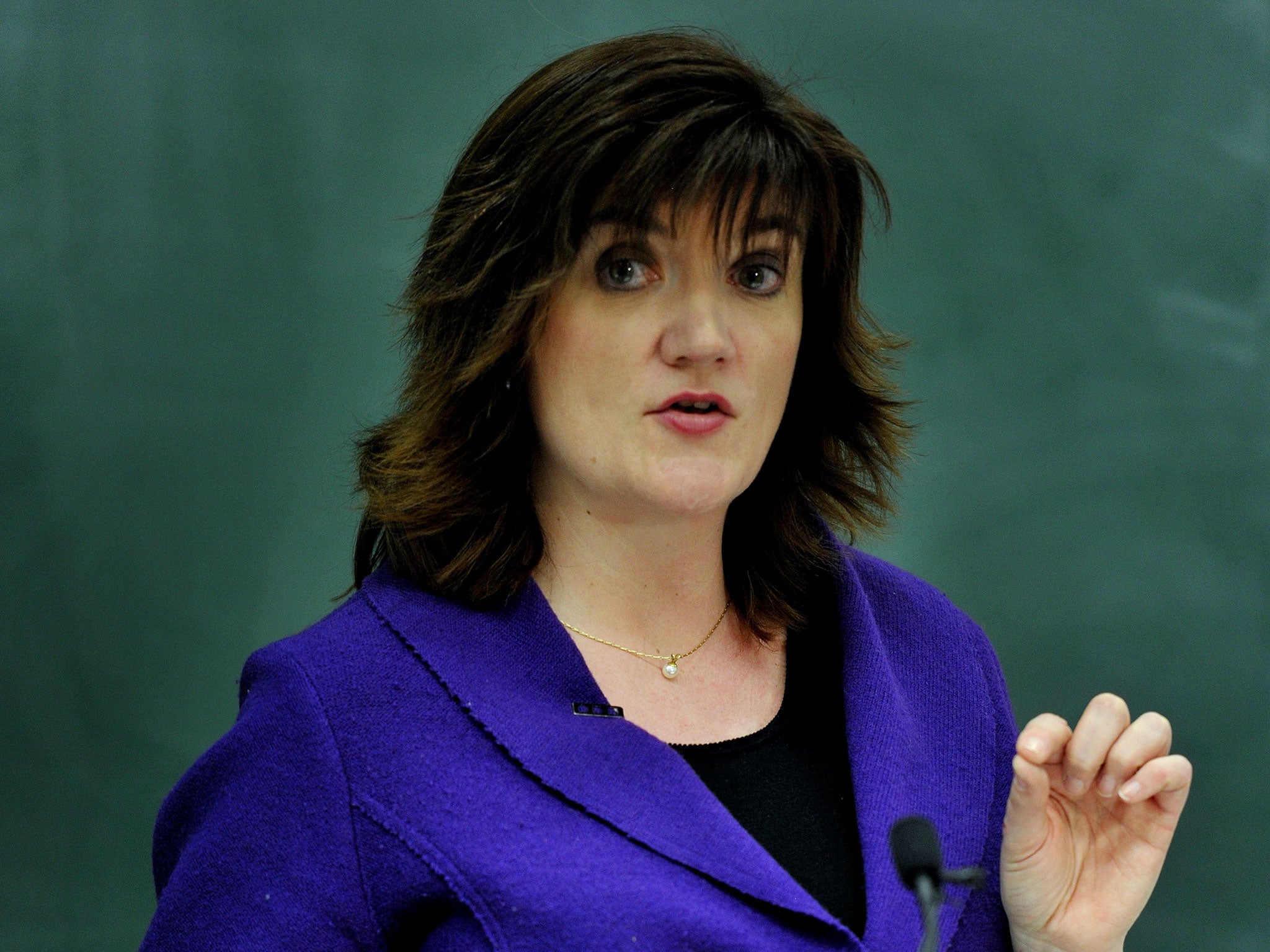Nicky Morgan hits out at Theresa May as PM faces first Commons revolt over grammar school plans
Former Education Secretary becomes latest Tory politician to condemn Ms May’s proposal

Your support helps us to tell the story
From reproductive rights to climate change to Big Tech, The Independent is on the ground when the story is developing. Whether it's investigating the financials of Elon Musk's pro-Trump PAC or producing our latest documentary, 'The A Word', which shines a light on the American women fighting for reproductive rights, we know how important it is to parse out the facts from the messaging.
At such a critical moment in US history, we need reporters on the ground. Your donation allows us to keep sending journalists to speak to both sides of the story.
The Independent is trusted by Americans across the entire political spectrum. And unlike many other quality news outlets, we choose not to lock Americans out of our reporting and analysis with paywalls. We believe quality journalism should be available to everyone, paid for by those who can afford it.
Your support makes all the difference.Theresa May faces her first Tory revolt after a former Education Secretary became the latest Conservative MP to attack her plans to unleash a new generation of grammar schools across England.
Nicky Morgan joined other Tories voicing concern over the controversial proposals by warning the Prime Minister she risks undermining years of progress by opening new grammars.
Another Conservative MP said Ms May’s plan to re-introduce the schools could “lead to a divisive system and put the clock back on education”.
Two other Conservatives already questioned the policy in the Commons, while another has said she will vote against part of the proposals relaxing rules on faith schools.
Signs of dissent appeared within hours of Ms May’s speech in central London, in which she confirmed she would allow new grammars to open and existing ones to expand as long as they undertook measures to help children from low-income families.
It was a major about-turn for her party, whose former leader David Cameron was unequivocal on how grammar schools had “always been wrong”. For Ms Morgan the new approach went too far.
She posted on Facebook: “I believe that an increase in pupil segregation on the basis of academic selection would be at best a distraction from crucial reforms to raise standards and narrow the attainment gap and at worse risk actively undermining six years of progressive education reform.
“The evidence is now incontrovertibly clear that a rigorous academic education does not need to be the preserve of the few.”
One supporter of Ms May suggested Ms Morgan’s opposition was expected – she was a member of Mr Cameron’s circle, who supported Michael Gove in the leadership contest and was sacked by the new Prime Minister.
But she was not the only one raising concerns about what could turn out to be the biggest education reforms in a fifty years. Redditch MP Karen Lumley said: “I went to a grammar school, and it certainly wasn’t for me.
“I took the 11-plus and was in the bottom quartile. Nobody moved in or out while I was at school and so I remained at the bottom of the pile. I hated it and left as soon as I took my exams and got a job. I am very sceptical about the idea that poor children will benefit from a return to grammar schools.
“This could lead to a divisive system and put the clock back on education, negating much of the great progress we have made over the last few years.”
Speaking in the Commons, New Forest West MP Desmond Swayne said he did “not relish the prospect of informing parents” whose children failed the 11-plus exam that their sons and daughters would have to be bussed to other schools.
Neil Carmichael, the Conservative Stroud MP who chairs the Education Select Committee, warned the discussion on grammars could “distract us from our fundamental task of improving social mobility”.
He said the government should ensure “that we make the best use of all the talent across the whole country and do not just talk about the few”.
Ms May only has a working majority of 17 in the House of Commons making her plans vulnerable to defeat. In the Lords the Tories are already in a minority, against an opposition made up largely of Labour and Lib Dem peers who oppose her reforms.
One Tory peer, former education minister David Willets, has already spoken out against Ms May’s plans, saying evidence suggested they fail to help disadvantaged children.
He said: “If you look overall, not just in Britain but around the world, at those school systems we admire that have got high performance and high standards, from Shanghai to Finland, by and large they don’t put their effort into trying to pick which kids they educate. They put their effort into raising standards for all the kids.”
Ms May also confirmed proposals to redraw rules restricting the proportion of children that faith schools take from their chosen religion to 50 per cent.
She argued that existing regulation only really impacted on largely oversubscribed and successful Catholic schools.
Tory MP Sarah Wollaston said: “I strongly oppose 100 per cent faith schools and will be voting against religious segregation of our children”.
She added on Twitter: “100 per cent faith schools can have nothing to contribute to a more integrated and cohesive society”.
Join our commenting forum
Join thought-provoking conversations, follow other Independent readers and see their replies
Comments